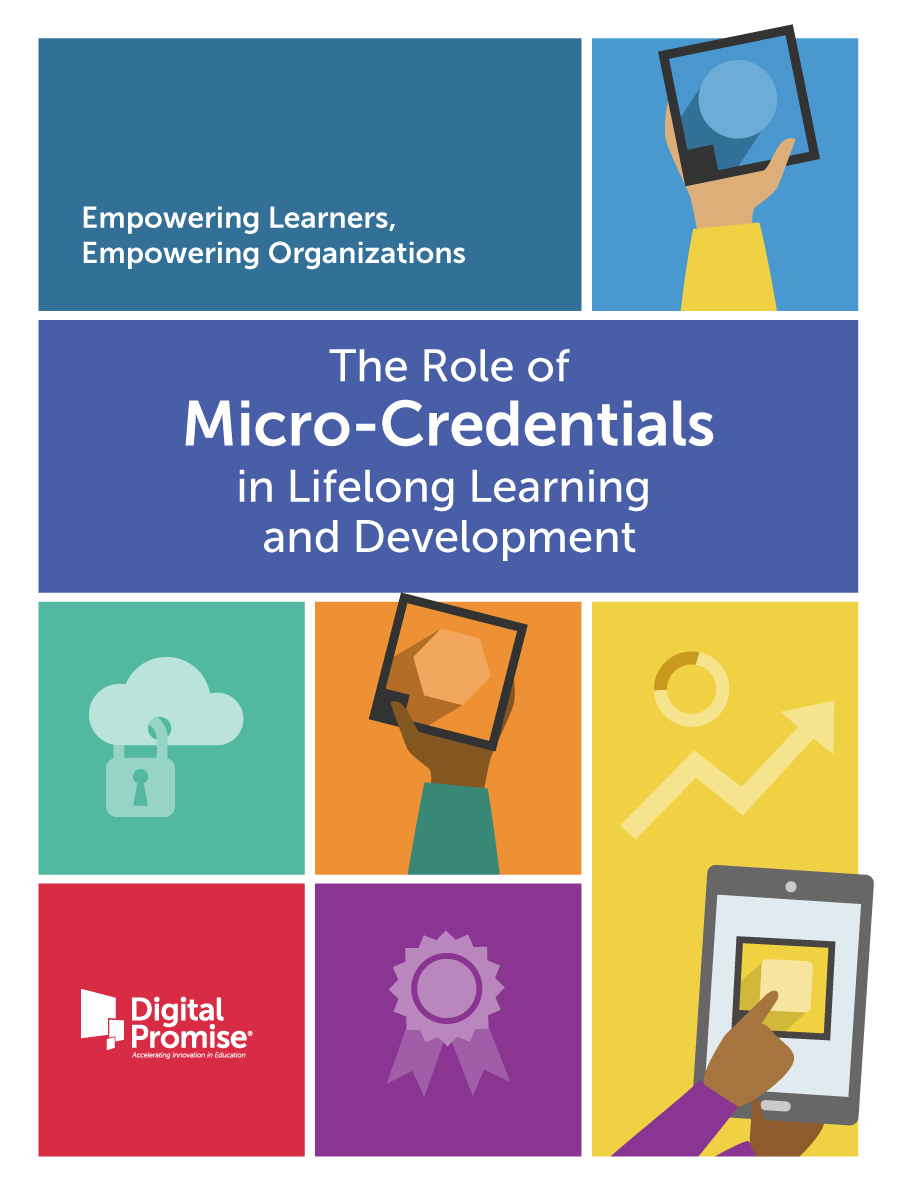
 Digital Promise’s Credentials initiative is proud to announce the publication of a free eBook, “The Role of Micro-Credentials in Lifelong Learning and Development: Empowering Learners, Empowering Organizations.” This eBook focuses on several important aspects critical to understanding micro-credentials, starting with Digital Promise’s definition of micro-credentials, followed by the position and role of micro-credentials in the credential ecosystem. This eBook also explores the value of micro-credentials for learners, higher education institutions, and the workforce. Lastly, this eBook dives into the implications of artificial intelligence (AI) on micro-credentials and the national trends in educator micro-credentials.
Digital Promise’s Credentials initiative is proud to announce the publication of a free eBook, “The Role of Micro-Credentials in Lifelong Learning and Development: Empowering Learners, Empowering Organizations.” This eBook focuses on several important aspects critical to understanding micro-credentials, starting with Digital Promise’s definition of micro-credentials, followed by the position and role of micro-credentials in the credential ecosystem. This eBook also explores the value of micro-credentials for learners, higher education institutions, and the workforce. Lastly, this eBook dives into the implications of artificial intelligence (AI) on micro-credentials and the national trends in educator micro-credentials.
Since 2013, Digital Promise has offered competency-based micro-credentials to learners, partnering with educational institutions and organizations that integrate them into professional learning pathways toward obtaining educational certifications. Through its comprehensive micro-credential platform, Digital Promise focuses on supporting historically and systematically excluded learners by providing an affordable and flexible way to enhance their career preparation and employability.
Competency-based micro-credentials are reshaping the way learners gain recognition for their skills and increasing access to postsecondary credentials and opportunities, particularly for historically and systematically excluded learners. Digital Promise’s micro-credential framework takes a more rigorous approach to designing high-quality micro-credentials that assess and recognize the application of specific skills and competencies. Micro-credentials are competency-based, research-backed, personalized, on-demand, and shareable. They leverage badging technology to issue digital certifications that provide details about the earning process and verify the competence of a skill. Through assessments, the learner demonstrates the new skills in a workplace setting and shows evidence of their implementation.
The definition of micro-credentials can vary depending on who uses the term and in what context. The terms “micro-credential” and “badge” are often used interchangeably since digital badges often represent micro-credentials. Many micro-credential providers consider a micro-credential to be the “learning/earning experience,” and a digital badge is the “technology used to display it” (Education Design Lab, 2023). In this eBook, micro-credentials represent the ability to apply learning and knowledge. They recognize and certify specific skills and competencies no matter how people acquire them—through different types of formal and informal learning, work, and life experiences.
To learn more about this topic, please read the chapters “The Role of Micro-credentials in the Credential Ecosystem,” “How Micro-credentials Can Unlock Success for Learners,” and “The Relationship between Digital Badges and Micro-credentials.”
Micro-credentials disrupt historical postsecondary pathways by offering ways to verify competencies gained through prior learning, on-the-job training, and lived experiences. It also increases access to postsecondary credentials, particularly for historically and systematically excluded learners, as it broadens opportunities to gain recognition for skills regardless of when and where they were developed. Micro-credentials offer a quick way to reskill or upskill, and they provide affordable, flexible, and personalized credentialing options compared to standard higher education degrees, enhancing career preparation, employability, and lifelong and life-wide learning opportunities.
Digital Promise’s micro-credentials are grounded in competency-based education (Brown, 2019). Competency-based education (CBE) focuses on the learner’s ability to acquire and demonstrate specific skills. Competency-based micro-credentials are based on research depicting the importance of competency in a skill and requires the learner to demonstrate it. Digital Promise’s Competency-Based Assessment Framework emphasizes principles including impact, equity, access, and language to ensure inclusiveness and relevance (Brown, 2019).
To learn more about this topic, please read the chapters “Disrupting Postsecondary Pathways Using Micro-credentials,” “Using Micro-credentials to Assess Competency-Based Education,” and “Micro-credentials Designed for Today’s Higher Education Learners.”
In the workforce, micro-credentials are seen as a solution to rapid industry changes, allowing employees to demonstrate critical skills quickly. Due to their accessibility, affordability, and flexibility, micro-credentials help reduce inequities that historically and systematically excluded individuals encounter. Employers value micro-credentials as they help narrow down the pool of candidates and verify specific skills needed to be successful for a position (Catalano & Doucet, 2013). Organizations are incorporating micro-credentials into their professional development programs to enhance productivity and offer employees opportunities for career-aligned skill development.
To learn more about this topic, please read the chapters “How Micro-credentials are Meeting the Needs of the Workforce” and “The Power of Professional Development: How to Use Micro-credentials as an Organization.”
As we look ahead, supporters of micro-credentials wonder about the role artificial intelligence (AI) will play in assessment. Assessing skills and competencies is critical in micro-credentialing, but using AI for assessments, especially competency-based work, is currently not the best practice (Bubeck et al., 2023). While AI has made strides in natural language processing, it needs more specific contextual understanding and subject matter expertise for accurate evaluation. As we learn more about how to leverage this technology, we are confident that we will discover applications for AI that enhance equitable access to and attainment of high-quality micro-credentials without compromising quality and trust.
To learn more about this topic, please read the chapter “Leveraging AI to Support Competency-Based Assessments.”
Brown, D. (2019). Research and educator micro-credentials. Digital Promise. https://digitalpromise.dspacedirect.org/server/api/core/bitstreams/1b66afd1-2673-40d6-a0ae-aaffdcb84faf/content
Bubeck, S., Chandrasekaran, V., Eldan, R., Gehrke, J., Horvitz, E., Kamar, E., Lee, P., Lee, Y. T., Li, Y., Lundberg, S., Nori, H., Palangi, H., Ribeiro, M. T., & Zhang, Y. (2023). Sparks of artificial general intelligence: Early experiments with GPT-4. https://arxiv.org/abs/2303.12712
Catalano, F., & Doucet, K. J. (2013). Digital “badges” emerge as part of credentialing’s future. Professional Examination Service. https://finepointwriting.com/wp-content/uploads/2013/07/White-Paper-Freelance-Writer-Sample.pdf
Education Design Lab. (2023). Micro-credentialing. https://eddesignlab.org/microcredentialing/